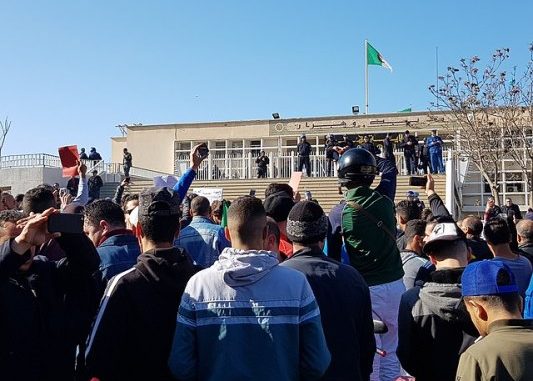
Since 22 February, Algerians have been protesting against their sick, frail, president who is standing for a fifth term of office. President Boutefika had a stroke in 2013 and has seldom been seen in public since. He cannot speak or walk but remains in office as a puppet figure fronting a corrupt and autocratic elite, widely known as ‘pouvoir’ (‘the power’). It comprises of military leaders, hangers-on and party officials eager for Boutefika to remain nominally in charge to protect their privileged position. It is widely felt that his brother Sa’id rules although he has not been elected to any office.
In 2014, Boutefika was in a Geneva clinic for much of the election campaign, and he is back there now, again receiving treatment. Algerians call Boutefika their ‘invisible president’: his last public speech was seven years ago. Consequently, there was opposition to him in the 2014 election, but this was mainly expressed by an exceptionally low turnout on polling day. Now all opposition parties have united, not around a programme to tackle the mounting social and economic problems, and not to put forward a credible alternative candidate, but to prevent a farcical fifth term.
The opposition’s call for Friday demonstrations steadily escalated, but on the evening of Sunday 3 March the protests exploded on to the streets after a spokesperson had announced the president’s intention to stand again and vacate the presidency after one year. Hundreds of thousands took to the streets in the biggest protests since the 2011 mass protests across the Middle East and North Africa. “They are just trying to delay things until they have a candidate who suits them. We want him gone. We want them all gone”, said one protester.
Universities emptied
The next day, the universities were empty as countless thousands of students thronged the streets. The average age in Algeria is 28-30 years – most young people have known only one ruler and did not experience the “dark years” of civil war, in which around 200,000 Algerians lost their lives.
Boutefika was initially seen as the mediator who ended the horrors of civil war, but even among the older generations there is no longer any loyalty and no patience. Unemployment is at 10% and youth unemployment is even higher. Sections of the elite have become filthy rich and exert a lot of power. Many Algerians have long been saying: “We are a rich country, we have oil and industry – why are we not rich?”
Apart from the Friday protests, all election candidates have threatened to withdraw and now the ranks of the masses have been swelled by the trade unions. Traditionally loyal to the FLN (the National Liberation Front that led the fight against the French colonialists) the unions have split, with one section calling for a general strike, starting on 10 March. The protests on Friday 8 March will be enormous. Women have already played a prominent role in the protests and the call is for them to mark International Women’s Day by turning out on-masse. With the strike is set to last four days, political and military leaders have warned, “we will not allow Algeria to return to the dark days” and “it started in Tunisia with roses and has ended in blood”.
This warning is unlikely to deter the youth and workers of Algeria but the question remains, if Boutefika is ousted, can the ruling party regain control by calling new elections and if not, how could events unfold in the absence of a mass workers’ party?
The creation of such a mass party that puts forward an independent, pro-working class programme, with the goal of the socialist re-organisation of society, is urgently needed to show a way forward for the vast majority of Algerians.
Special financial appeal to all readers of socialistworld.net |
Support building alternative socialist media Socialistworld.net provides a unique analysis and perspective of world events. Socialistworld.net also plays a crucial role in building the struggle for socialism across all continents. Capitalism has failed! Assist us to build the fight-back and prepare for the stormy period of class struggles ahead. Please make a donation to help us reach more readers and to widen our socialist campaigning work across the world. |
Donate via Paypal |
| M | T | W | T | F | S | S |
|---|---|---|---|---|---|---|
| 1 | 2 | 3 | ||||
| 4 | 5 | 6 | 7 | 8 | 9 | 10 |
| 11 | 12 | 13 | 14 | 15 | 16 | 17 |
| 18 | 19 | 20 | 21 | 22 | 23 | 24 |
| 25 | 26 | 27 | 28 | 29 | 30 | 31 |


Be the first to comment